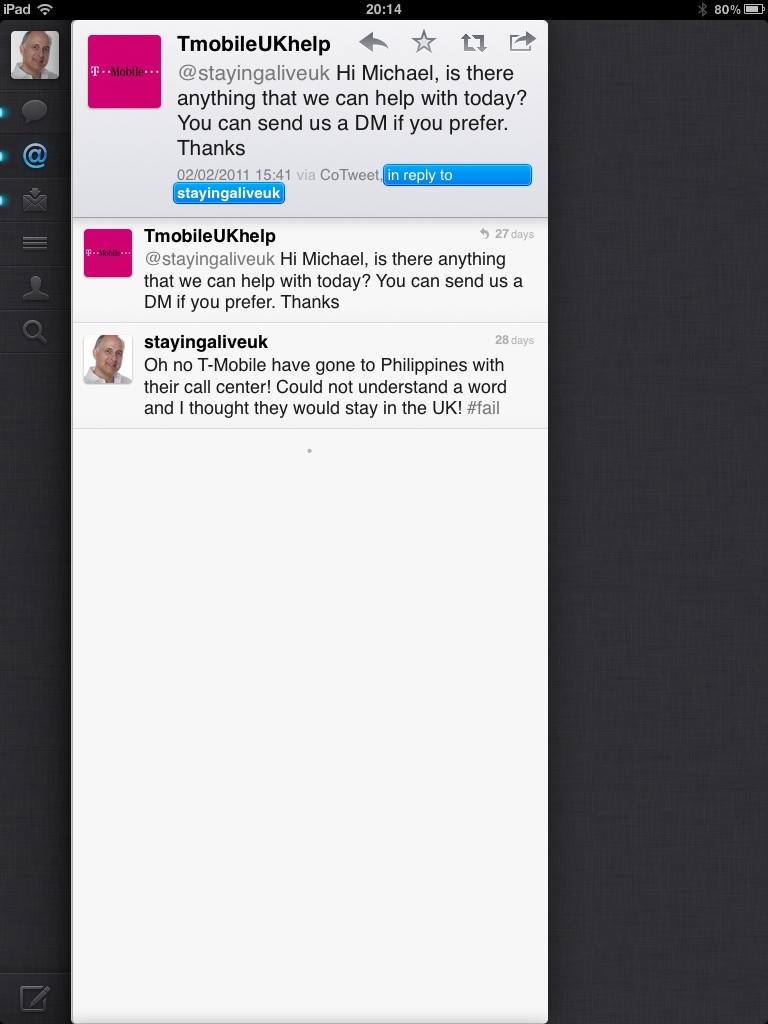 I am sharing with you my own personal experience of the impact of social media in customer service. Now my experience of conventional customer service was very poor, but via social media it was excellent.
I am sharing with you my own personal experience of the impact of social media in customer service. Now my experience of conventional customer service was very poor, but via social media it was excellent.
Firstly a little bit of background.
I am a T-Mobile customer and have been a customer of theirs for about 6 years, when I decided to purchase my very first blackberry, when the Blackberry Pearl was released. I was with Orange ever since I became a mobile phone user, so it took a lot of convincing for me to move to another network.
The service I had received from Orange was superb.
Anyway I made the jump and that was it. I was equally impressed with T-Mobile's service and their agents did an excellent job. So it all worked out for me. I was a very late adopter in the Blackberry market, but felt with the smaller phone my wait was justified.
Now fast forward to September 2010 and for my Birthday I treated myself to an iPhone 4, and had an early contract upgrade, which was a real gift.
All seemed to be well and my first bill was a bit of a mess coming out of one contract and starting a new one. Anyway I decided to leave it for a few months and review it again to make sure all was well. I don't get paper bills, so I get a monthly text to let me know that the bill is ready online. I don't know about you but when I get that message I don't immediately jump online and check my bill so I ignored it for a few months. I did notice that although I am not a huge user, the bill appeared high so decided to investigate further.
I then discovered they had been overcharging me ever since my changeover for Blackberry Booster, which of course I did not need or indeed use on my iPhone! So I decided to call.
I will just summarise this quickly as I want to get on to the social media bit.
I initially phoned their customer services and connected with the Philippines and it was not a pleasant experience at all. Basically I could not hear them properly because of the line quality and on top of that the agent would not allow me to speak and if I did speak she would repeat back what I had said to make sure she understood what I had just said. This meant a lot of wasted 'yes that is correct' sentences on my part.
After a long while, when she finally realised she could not solve my problem, she ended the call by saying she would send my account for re-calculation.
I decided to share my frustration on twitter and I received a nice response from T-Mobile.
In the end I had to email T-Mobile to get them in the UK to call me to sort it, which in fairness they did quickly.
My bill should now be showing the correct figures. OK when I did check a few days later, surprise, surprise it did not. Better still they had given me an early termination penalty for cancelling my Blackberry booster. I have not had a Blackberry for 4 months now! After sorting that with the Philippines again, they confirmed all should be well. However my bill online was still incorrect, so I resorted to Twitter.
What I received from T-Mobile via twitter was a very fast and satisfactory conversation that was resolved to my satisfaction, whereas the initial telephone conversation I had was far from resolved.
For me it shows that Social Media can work and have significant impact on the Brand, providing it is done well and T-Mobile have done this very well on this occasion.
